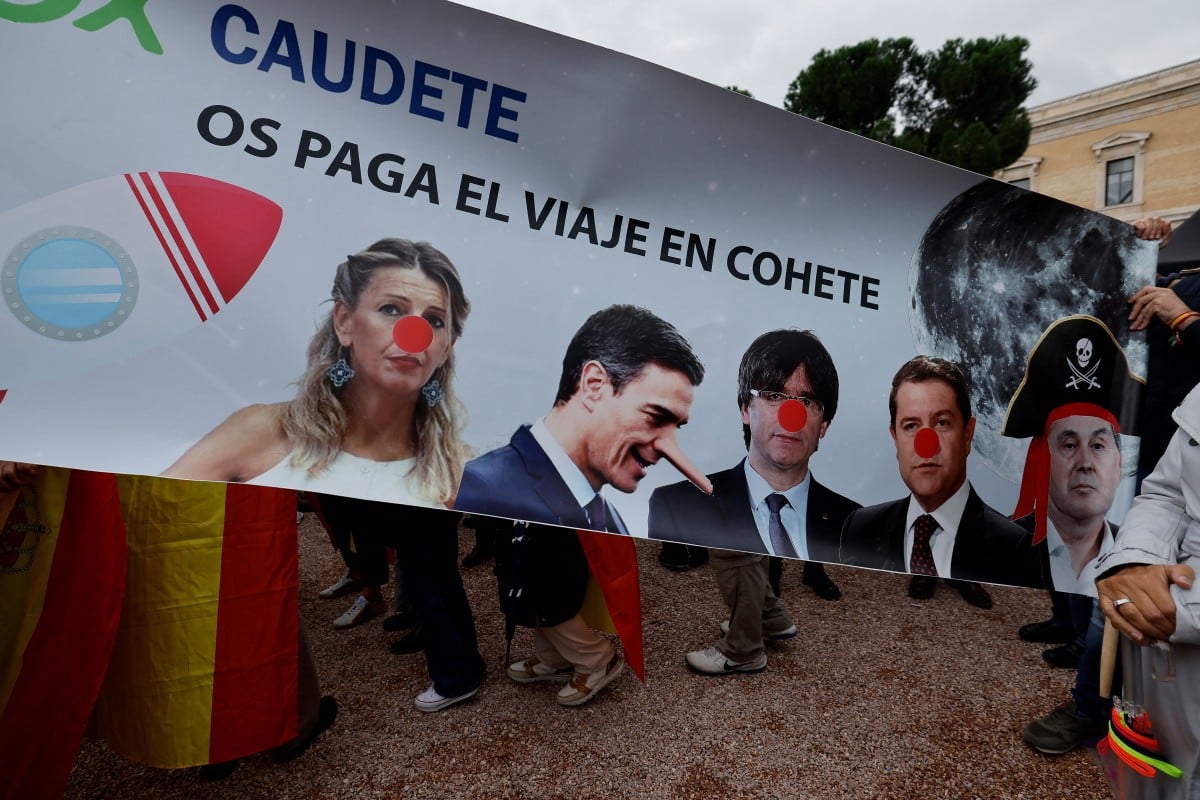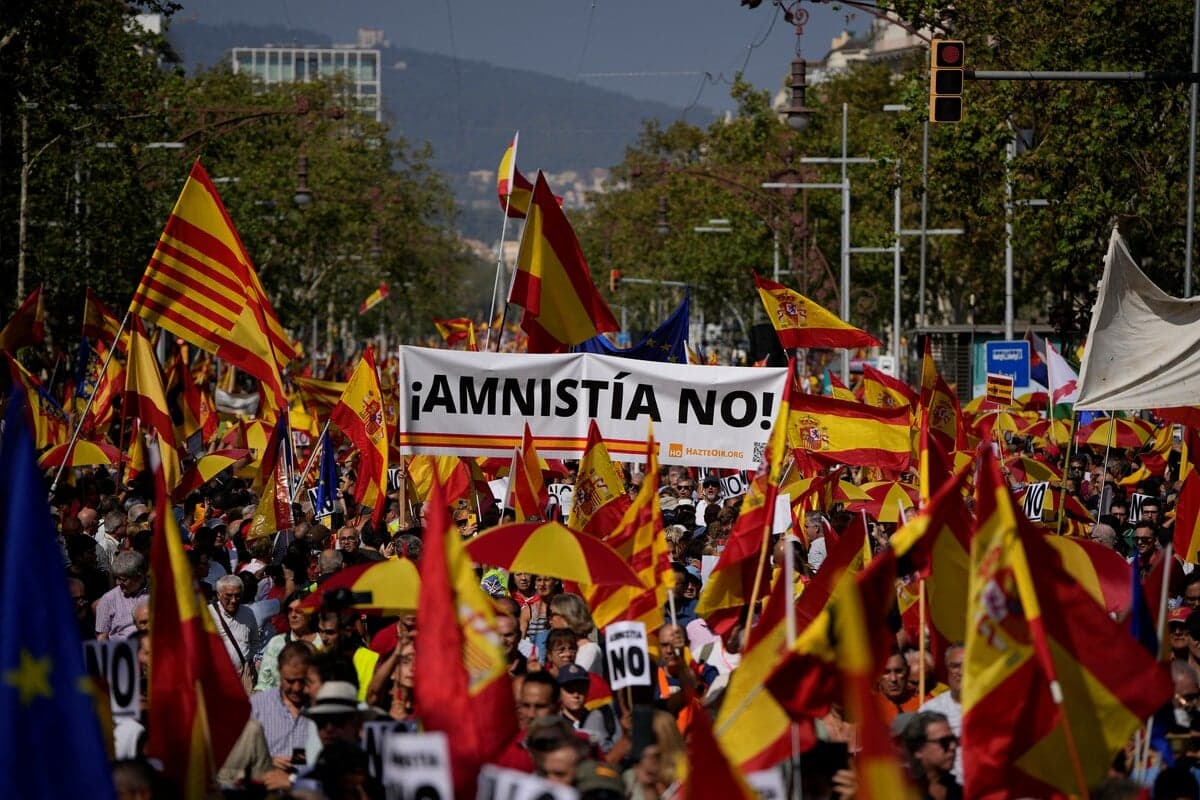For some in Spain, caretaker Socialist (PSOE) Prime Minister Pedro Sánchez is a shifty, power hungry politician willing to do and say anything to cling onto power. Others go further. Right-wing Partido Popular (PP) leader Alberto Núñez Feijóo describes him as a 'danger to democracy', and the Spanish right-wing media machine have long painted the smooth PSOE leader as a dictator seeking to establish 'Sanchismo' rule in Spain.
Why do they say this? Because Sánchez has backed a highly controversial legal amnesty for Catalonian separatists who tried to declare independence in 2017. Why would he do this? Most would argue it's solely because he needs the votes of Catalan parties to be re-elected.
READ ALSO: 'End of democracy': Spain's opposition steps up criticism of amnesty plan
In July's general election the PP won the most votes but failed to gain an absolute majority, even with the support of far-right party Vox.
After Feijóo failed in his own attempt at forming a government, it fell to Sánchez to try and find votes.
He already has the support of far-left coalition partners Sumar, but needs the support of Junts per Catalunya, led by exiled Carles Puigdemont, and the ERC. They have demanded a legal amnesty in return.
READ ALSO: Who are the 'thousands' of people who could benefit from Spain's amnesty?
The proposed amnesty, let alone the prospect of an amnesty in exchange for votes in order to stay in power, has seriously divided Spanish society. Thousands have taken to the streets in protest. But it is not only Sánchez and the PSOE's political opponents that oppose it.
Members of the Spanish judiciary have also stepped up their criticism, as well as members of Sánchez's own PSOE, including regional leaders. The Professional Association of Magistrates, a body that represents judges in Spain, have called the proposed amnesty "the beginning of the end of democracy" that would "destroy the rule of law."
Plenty of PSOE voters are unsure about it too.
40.4 percent of those who voted for the PSOE in the general election believe that Sánchez should give into the separatists demand and would prefer another election, according to polling data done for El Mundo. In terms of the wider general public, 50.8 percent say that the amnesty is not acceptable "in any case" and 59 percent prefer another election.
In recent weeks, thousands have taken to the streets to protest against the amnesty. The PSOE even decided to suspend all activity at its headquarters following calls for further protests in front of its buildings and "the aggressive spirit of its appeals."
READ ALSO: Thousands rally in Spain against amnesty for separatists
A risk worth taking?
Sánchez is well known as a smooth political operator and risk taker. It was his gamble, after all, to call the general election the day after his PSOE took a drubbing in regional and local elections and the Spanish right were in the ascendancy. Did it pay off? Arguably, yes. He denied the right a majority, removed the possibility (for now) of the far-right in government, and did this knowing he had more potential coalition partners than the PSOE.
However, although an effective political maneuverer, we must not forget that ultimately any calculation Sánchez makes is a political one. In this sense, some of the criticisms levelled at him by the Spanish right are accurate -- he will do what he needs to do to stay in power.
 Dozens of right-wing protests have been held across Spain to protest Sánchez's planned amnesty in return for Puigdemont's political support. (Photo by OSCAR DEL POZO / AFP)
Dozens of right-wing protests have been held across Spain to protest Sánchez's planned amnesty in return for Puigdemont's political support. (Photo by OSCAR DEL POZO / AFP)
As a recent Financial Times editorial stated: "Sánchez would not go down this path if his job were not on the line." In the past, the caretaker Prime Minister had described the idea of an amnesty as "unacceptable."
But to separate the political from the policy for a moment, does that necessarily mean that an amnesty is the wrong thing to do? Some on the Spanish left argue certainly not. Rather, they suggest that an amnesty would not only be the right thing for Sánchez and the PSOE, but for Spain.
When he came out publicly in support of the amnesty for the first time recently, Sánchez claimed it would be done "in the name of Spain, in the interest of Spain, in defence of coexistence among Spaniards." Some already give Sánchez credit for taking the sting out of the so-called 'Catalan question'. His (again, very controversial) decision in 2021 to pardon nine officials jailed for their part in the 2017 referendum was similarly described as undemocratic, anti-Spanish, and unconstitutional.
In political terms, however, the move has served to smooth tensions in Catalan society, and more broadly between Catalan separatists and the central government in Madrid. Since then, pro-independence sentiment in Catalonia has waned and the PSOE has performed well, gaining seats and increasing its vote share by 15 percent in the July general election.
For Sánchez supporters, an amnesty would be the next logical step on the road to normalising ties with Catalonia and bringing it back into the political fold. This is in stark contrast to the harsh rhetoric of the Spanish right. Incessantly pitting real 'Spaniards' against Catalans and accusing their political leaders of being traitors or criminals will likely do little to calm tensions.
For all the Spanish right's criticisms (some of which with regards to Sánchez personally are accurate), it has offered little alternative to how to solve the Catalonia question. One must wonder: would another unilateral independence bid be more likely under the conditions of, firstly, an open dialogue with a PSOE-led coalition, or, secondly, a combative right-wing government?
PSOE bigwigs have been in Brussels to negotiate with Puigdemont in recent days. Reports suggest that a deal is near. Sánchez has until November 27th to finalise it and get the votes he needs. If he fails, Spain will likely head to the polls again in the new year.
But do Spaniards really want to have their sixth general election in a decade? Or is the issue of an amnesty really worth being stuck in a political stalemate for another few months? And what would another election realistically solve? Would either party win an absolute majority? It seems unlikely that those PSOE voters sceptical of the amnesty would switch to the PP and risk putting Vox into power.
Whatever happens, one thing is for sure: la amnistía will continue to be controversial and divide Spanish society at a time when the middle ground seems to have evaporated.

Join the conversation in our comments section below. Share your own views and experience and if you have a question or suggestion for our journalists then email us at [email protected].
Please keep comments civil, constructive and on topic – and make sure to read our terms of use before getting involved.
Please log in here to leave a comment.